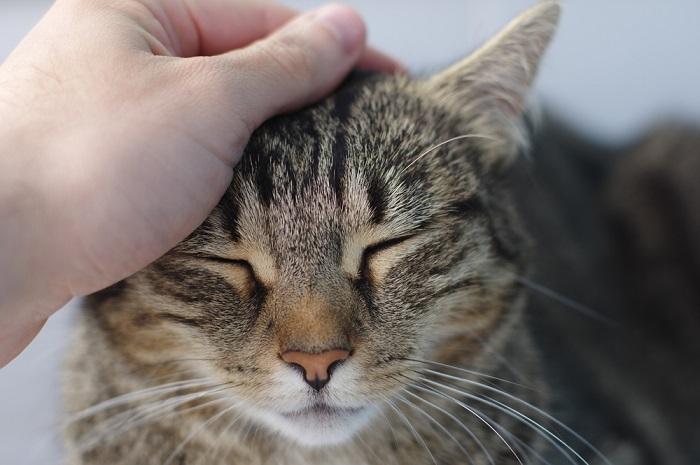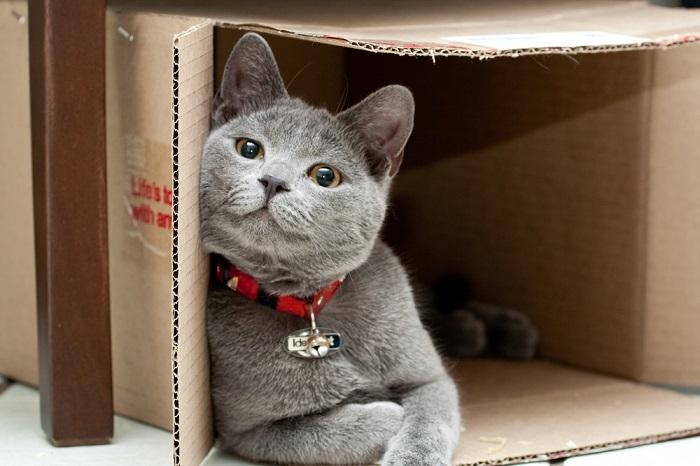
Imagine this. You’ve just adopted a new feline family member. You’re brimming with excitement as you travel home in the car with your new arrival in the carrier next to you.
When you finally get home, the whole family is waiting eagerly as you open the door of the cat carrier. However, as you all stand grinning, ready to welcome your new cat home with some affectionate snuggles, nothing happens.
You gaze in and find that your new puss is cowering at the back of the carrier, showing no sign of joining the party. You gently go to reach for them, only for them to race past you and set up camp in a hard-to-reach spot under the sofa, where they remain for the next four hours.
Disappointing, right? But if you have a shy cat, it might be all too familiar! Many cats act nervous or fearful, especially in situations where they are uncomfortable. But will a shy cat be shy forever? And what can you do to help them feel more confident?
Scared Cat Behavior
Scared cats can appear to be disinterested, aloof, or even angry! But it’s important to remember that they’re not being rude; they’re just frightened. If you approach it correctly, you can create a good relationship with them. So, what behaviors should let you know that your cat is scared?
Firstly, they might hide and withdraw from people, animals, or sources of other hustle and bustle. They might also ignore you if you call them and run away if you approach them. If they’re feeling distressed or threatened, you might hear them hissing or growling at anyone or anything approaching.
Your cat’s body language might also give you some clues. If their ears are back, their teeth bared, their tail puffed, or their pupils dilated, there’s a good chance they’re scared and don’t want company. Speaking of their tail, as well as being puffy, they might be swishing it side to side frantically, and if the threat comes too close, they might swipe at it with their paws.
Why Is My Cat Scared of Everything?
Sometimes, it can seem like your cat is scared of everything, from loud noises to new people and the local tomcat. Some fears are rational. After all, who wants to be beaten up by the local feline bully?
On the other hand, sometimes your cat’s anxiety can become a real problem and stop them from having a good quality of life. For example, suppose they hide away for days every time your groceries are delivered, triggering other stress-related conditions like cystitis or overgrooming. In that case, you might need to step in.
How Do You Calm a Scared Cat?
If your cat is really scared, you should first try to determine why. If the cause is apparent, like a noisy kitchen appliance or a dog visiting the house, remove the problem as best you can.
If you’re unsure why your cat is scared, or if the stimulus can’t be controlled, like fireworks, for example, there are other calming measures you can take. Anti-anxiety and calming remedies can be very effective, as plug-in diffusers and sprays or as oral supplements.
Speak to your veterinarian if you’re not sure which product might suit your cat best.
8 Ways To Help Your Shy Cat Be More Confident
If you are a pet parent to a scaredy-cat, try the following steps:
1. Take It Slow

Speak to a scared cat quietly and pet them gently if they seem to enjoy it.
No matter how much you try, you can’t fix a frightened feline overnight. If you try to rush them or push them to change, you won’t earn their trust, and you’ll be unsuccessful. It’s important to take baby steps, never going too far outside their comfort zone.
If you want your cat to stop reacting to something, you can try controlled exposure. However, when you expose your cat to whatever makes them anxious, you should do so gradually and stop if they react.
2. Use Positive Reinforcement
You might notice that even the most food-orientated felines don’t care about treats when they’re frightened. However, as long as you approach them slowly, calmly, and quietly, you should be able to get closer to them over time.
As you make progress and they become more comfortable with your presence, reward them with a tasty treat. Once they are at ease with you near them, move on to gentle handling, perhaps a tickle under the chin or behind the ear. Over time, treats and a fuss could be a reward, depending on whether your cat prefers food or attention!
Also Read: The 7 Best Calming Cat Treats
3. Read Their Body Language
Your bond will grow if you understand your cat’s communication via their body language. So, if their ears are back, their tail is swishing, or they’re hunched up trying to make themselves invisible, they probably don’t want to be bothered.
On the other hand, if their ears are forward and they’re purring or chirruping, it’s likely that they’re inviting you to join them. Remember, it’s not just about understanding their body language. It’s about following through and respecting their wishes.
4. Create a Safe Space
Giving your cat somewhere to hide when they’re scared might seem counterproductive. After all, won’t that encourage them to hide? Well, giving them a guaranteed safe place where they feel secure could make them more confident because they know they can seek refuge there whenever they need to.
Their safe space should be in a quiet part of the home and ideally raised off the ground so that they can survey their surroundings. Making it cozy with blankets and using pheromone or calming sprays will also help.
5. Do Things They Enjoy

Find out your cat’s likes and dislikes so you can interact in positive ways.
If you want to encourage your cat to come out of their shell, it’s best not to force them to be something they’re not. So, if they’re not the type to enjoy a cuddle, don’t pick them up, and if they couldn’t care less about the new cat toy you bought, don’t keep waving it in their face!
If you interact with them in a way they enjoy, they’ll start to trust you and associate you with positive feelings. Over time, this should give them more confidence.
6. Remove Triggers
If your cat is frightened, it’s a good idea to remove any potential stress triggers from their environment. Even if you can’t control the reason for their stress or fear, you can still create a nicer environment for them.
So, keep things calm and quiet, keep the television at a lower volume, and avoid shouting or sudden frantic movements.
7. Use Calming Measures
Anti-anxiety medication and calming products can be very effective, especially if they’re used alongside other methods to improve your cat’s confidence.
Using a pheromone or calming diffuser in the room where they spend most of their time or spraying it in their hidey-hole should help make them feel calmer and more confident.
8. Get Expert Help if You Need It

Reach out to your vet or an animal behaviorist if you’re unable to make progress with your fearful cat.
Some cases of fear in felines are so extreme that they affect your cat’s quality of life, and perhaps even yours, too. If you and your cat companion are struggling with their stress and shyness, it’s time to speak to the experts.
Veterinarians and certified feline behaviorists can offer support, advice, and even medication if it’s needed.
Also Read: 6 Subtle Signs Your Cat Loves You







